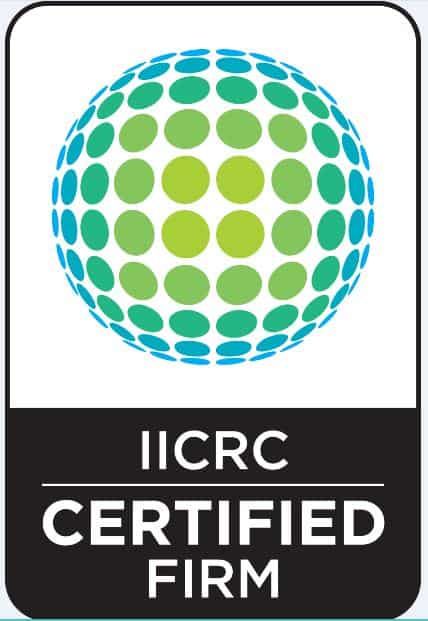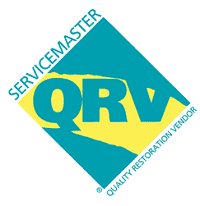Your property is your most significant investment, and you want to protect it. Water damage can be one of the most significant risks for homes and apartments everywhere. If you’re experiencing water damage caused by a neighbor, you need to stop it in its tracks.
Fortunately, we’re here to help.
In this blog, we’ll explain what to do if your neighbor’s property is causing water damage in your home. We’ll also discuss how to get the damage covered and which laws might apply.
Here at ServiceMaster of Lake Shore, we help hundreds of homeowners across Chicago and the suburbs deal with water damage from their neighbors, so we know how to resolve these complex situations.
Let’s dive in.
Key Takeaways
- If you suspect water damage to your neighbor, look for pooling water without an obvious source, spots on ceilings, musty smells, peeling paint or wallpaper, visible mold, and warped floors or walls. These are indicators that water damage may be originating from a neighboring property.
- When addressing the water damage from a neighbor, start by discussing the issue with your neighbor. Next, file a claim with your insurance company, and then contact a water damage restoration company to repair and restore your property such as ServiceMaster of Lake Shore 312-707-8597
- A few water damage rules impact water damage disputes between neighbors. Natural conditions usually don’t incur liability, but alterations causing harm can. Carelessness by a neighbor leading to water damage can result in them being liable for repairs.
6 Signs of Water Damage Caused by Your Neighbor

Not sure where the water damage is coming from?
Check for these telltale signs to confirm it’s due to your neighbor:
1. Water runoff
One of the most obvious signs of water damage is pooling water.
If you notice pooling water without an obvious source, the water is likely coming from your neighbor’s property. Keep in mind that water runoff can occur both indoors and outdoors.
Outdoors, it could be rainwater runoff that comes down your neighbor’s property and pools around your foundation.
Inside, it could be water from a broken pipe in your neighbor’s house that forces its way under your floorboards.
2. Spots on the ceiling
Damp or discolored spots on your ceiling could be due to a toilet or sink overflow from an upstairs neighbor or even a burst pipe in the ceiling above your apartment.
If you notice new spots on your ceiling, act quickly. Over time, water damage can compromise the drywall in your ceiling and cause structural damage.
3. Musty smells
A musty, damp smell is a crucial sign of water damage. The reason is simple: water damage creates humidity, which creates the perfect environment for mold and mildew growth.
Even if you can’t see water damage, musty smells are a sign that you may have hidden water intrusion behind the walls or in the ceiling of your home.
4. Peeling paint or blistered wallpaper
Peeling paint and blistered wallpaper both indicate the presence of water damage.
When moisture saturates walls, it causes wallpaper and paints to lose their adhesive grip on drywall, causing unsightly damage that can be expensive and difficult to repair.
5. Mold growth
Visible mold growth is a sign of water damage. Mold growth may look like green, gray, or brown patches on walls, ceilings, or floors. It can appear quickly after water damage occurs.
6. Warped floors, ceilings, or walls
Even if water damage isn’t visible, it will impact building materials. Floorboards will warp, ceilings will sag or discolor, and walls may feel moist or soggy to the touch.
What Laws Apply to Water Damage Disputes Between Neighbors?

Water damage disputes between neighbors can be challenging to manage.
While there are many ways that water damage can occur, the most common are due to the landscape of a neighbor’s property or due to naturally occurring conditions.
Here are a few water damage rules that may impact water damage disputes between neighbors:
1. Natural Conditions
In most cases, a neighbor isn’t legally responsible for the damages resulting from the land’s natural conditions.
For example, if your neighbor lives on a slightly higher property than yours, and the rain runs down their property onto yours, the neighbor isn’t usually considered liable.
2. Reasonableness Rules
The exception to liability regarding natural conditions is under so-called “reasonableness rules.”
If the neighboring property owner has made changes to their land that have altered the natural condition of the property in a way that caused harm to another neighbor’s property.
3. Common Enemy Rule
Historically, states have seen rainwater and other natural water sources as a so-called “common enemy,” meaning they impact all landowners equally.
Given this rule, each neighbor must protect their land from all water sources, including runoff and surface water.
This means that you must protect your land even if your neighbor took steps that resulted in additional water runoff on your property.
4. Civil Law Rule
Civil law rules are the opposite of common enemy rules. These rules say that any landowner who changes their land in a way that alters the natural flow of surface water could be liable for water damage if said alterations were unreasonable.
5. Carelessness
If you experience water damage caused by a neighbor and can prove it in court, you may be entitled to collect damages needed to pay for the repairs, replacements, and other costs.
In some cases, a court may require your neighbor to fix the problem that led to the water damage.
6. Water Damage Insurance
If you’ve experienced water damage caused by a neighbor, homeowners and/or flood insurance may cover the damage.
In most cases, homeowner’s insurance won’t cover the damage that comes from outside your home.
Because water insurance policies vary in coverage, you’ll need to check with your provider to understand your coverage.
What Steps Should I Take to Address Water Damage Due to my Neighbor?

If you’ve experienced water damage caused by a neighbor, figuring out the next step can be challenging. Here’s what we recommend:
1. Talk To the Neighbor
First things first, you’ll need to discuss the water damage with your neighbor.
It’s possible that your neighbor is unaware of the damage and that it’s also harming their property.
Notifying them allows you to work together to solve the problem.
2. Submit a Claim to Your Insurance
Regardless of how the water damage happens, you’ll need to submit a claim with your homeowner’s insurance company for the damage to your home.
This is true even if the appliance that malfunctioned and flooded your floor was in your neighbor’s apartment.
Once your insurer receives the claim, they can work out coverage levels and determine who is responsible.
3. Call A Water Damage Restoration Company
As your insurance company determines coverages and payouts, you’ll need to protect your property and prevent future damage.
The best way to do this is to call a water damage restoration company to help repair the damage.
A restoration company will help you identify the source of the water damage, pinpoint even hidden water damage, repair all affected building materials, and restore the property to its pre-damage condition.
If you’re in the Chicago area, ServiceMaster of Lake Shore can help. Call today: (312) 707-8597
Need to Repair Water Damage Caused by Your Neighbor in Chicago or Suburbs? We Can Help!
Our team at ServiceMaster of Lake Shore provides comprehensive water damage restoration services for homes, apartments, and condos across Chicagoland, including Lincoln Park, Lincoln Square, the Gold Coast, and the North Shore suburbs.
Contact us today to learn more about our services and how we can help you.
DISCLAIMER: The resources provided by ServiceMaster or Lake Shore are for educational purposes only and do not constitute legal advice. Consult your legal counsel if you have specific legal questions.






